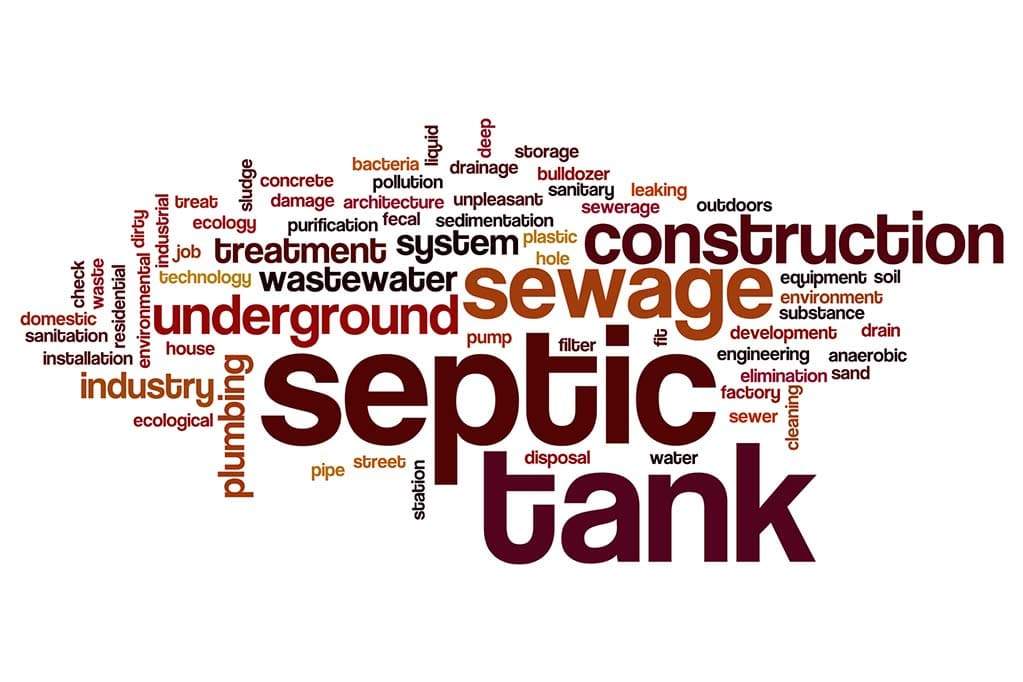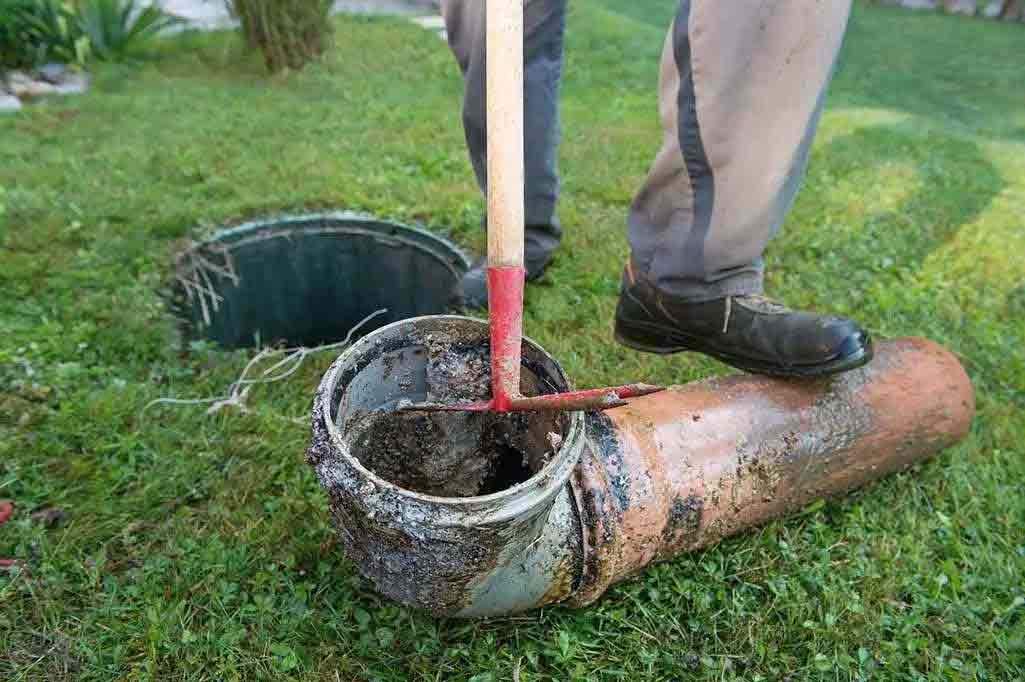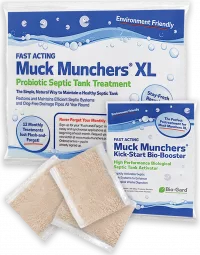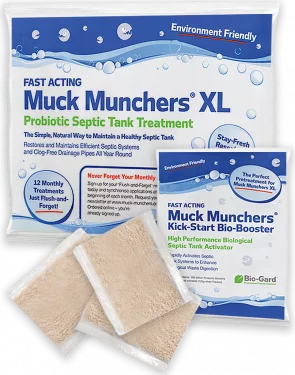What Causes Septic Tank Problems?
Are you baffled as to what causes septic tank problems? You’re not alone. Septic tanks, while highly efficient at digesting organic waste, can still fall prey to a variety of problems over time.
As any experienced septic system owner will tell you, there’s more to maintaining a healthy tank than simply allowing it to ‘do its business’. You need to:
- Be careful with what you flush
- Keep a close eye on the area around your tank and soakaway
- Regularly top-up with an effective bacteria treatment.

Of course, no two septic tank systems are ever quite the same, as your circumstances will vary compared to the next person’s. However, there are a few causes of septic tank problems that we can all easily avoid.
Common Causes of Septic Tank Problems
If you are starting to notice the area around your septic tank emitting foul smells – that your pipes and plumbing are making strange noises – and that your drains and toilet are backing-up or slow-draining, there is a good chance there’s a problem with your septic tank. Septic tanks are more than simply empty vessels for wastewater and toilet detritus.
A septic system is in fact highly sensitive, and what’s more, it requires careful attention over years of use. You shouldn’t, ideally, have to pump out your septic tank more than a couple of times a decade. Any more than that, and there may be issues further down the line that need investigating.
Muck Munchers help keep your septic tank’s effluent levels in check and keep your system ticking over and to help prevent septic tank problems from occurring. However, in addition, it’s a good idea to make a few checks if you ever notice your tank or plumbing systems start to cause concern.
Poor Septic Tank Maintenance
A septic tank will require emptying at some stage in the future. That said, providing you keep your tank topped-up with bacteria – and only flush natural waste and solids – you can keep your tank from needing emptying for years on end.
Poor maintenance can mean simply not checking your tank levels from time to time. When you first have a septic tank installed, your engineer should provide you with information on a healthy maintenance schedule.
This may include testing sludge levels with a dipstick, and to perform menial checks every so often. Providing you are proactive with your septic tank maintenance and checks you can be sure to stave off any major septic tank problems further down the line.
Tree/ Plant Root Damage
Unfortunately, there are cases where roots trees, shrubs and hedges grow into a septic tank or soak away causing septic tank problems.
There’s not much you can do to deter greenery from growing, however, should roots intrude, you may find your septic tank stops draining properly and that significant damage occurs.
It’s important to survey of the local ground before having a septic tank installed. A clear area without risk of tree growth is ideal. However, once a tree or large plant starts growing into your septic system, it could mean calling for a tree surgeon or, at worst a new soakaway.

Damaged Baffle / Pipes
Pipes and baffles are crucial components in the modern septic tank system. Ultimately, it is the job of the baffle to prevent as much heavy or solid detritus from draining through your soakaway as possible. A damaged baffle will cause various septic tank problems including preventing your system from efficiently treating wastewater and effectively discharging and dispersing it into the local environment safely.
This isn’t just bad news for the local area, it is bad news for you, the tank owner. A clogged, blocked or inefficient soakaway is going to potentially let your septic tank build up more and more waste, and no matter how many Muck Munchers are present, you are at risk of overflow sooner rather than later.
Damaged drainage pipes pose much the same problem – if there is any faulty or damaged pipes septic system, you are at risk of seeing waste rising back up again.
Ground Movement
It may not seem too obvious to the naked eye, but the ground around which your septic tank and soakaway is based may shift and move over time, particularly if installed badly.
Unstable or unsteady ground is never a good mix for septic tank installations, which is all the more reason for a thorough survey before installation takes place.
Movement in the ground is not necessarily something septic tank owners can do much about when it occurs. However, it still pays to know when this septic tank problem is arising.
Ground movement can pressurise your septic tank, cause cracks and breaks. This can let additional water into your tank and therefore slow down the waste digestion process. It can also mean that you end up with a rapidly-filling tank, leading to costly, unnecessary pumping call-outs.
Discharging Chemicals and other Contaminants
While it’s expected that you will likely need to clean your toilet and sinks, discharging certain chemicals at high strength may cause serious septic tank problems for your septic tank.
Disrupting the bacterial balance in your septic tank is easily done if you regularly flush chlorine bleach and other non-septic tank safe products.If there are no bacteria living in the tank to break down the waste you flush and drain, you may risk your system breaking down too, unable to handle the pressure and demand. Therefore, it is important to make sure you top up your septic tank regularly with Muck Munchers to digest the organic waste, as well as to rethink the chemicals and products you are regularly flushing into your system.
How Can You Fix Septic Tank Problems?
Crucially, it is easier to prevent septic tank problems than to cure them. You may need to consider calling an engineer to repair your tank and system, to replace parts, or flush through or pump out your tank completely.
That’s why it is so important to ensure you have a maintenance schedule, which includes topping-up bacteria (Muck Munchers) regularly to ensure the waste breaks down as expected.
However, make sure to take care of the following if you want to avoid long-term problems with your septic system, or having to repair and/or replace anything outright.
Watch What You Flush
The golden rule of careful septic tank ownership is to ensure that you only flush waste and products that your system, and its bacteria, are naturally able to break down and handle. It stands to reason that you may need to flush and/or drain a variety of things through your septic tank.
However, the safest way to prevent any kind of damage or build-up over time is, of course, to stick to the three Ps. These are pee, poo and toilet paper. Anything more solid will cause major septic tank problems in the long term. Just as you shouldn’t flush sanitary products and baby wipes into a sewer-linked toilet, for example, you should avoid flushing anything more than the three P’s into a septic tank.
The same goes for chemicals – while you are likely going to need to clean your toilet with bleach or specialist products occasionally, anything too abrasive is going to reduce the bacteria in your tank. Try switching to septic tank safe products and eco-friendly cleaners to keep your tank healthy.
Regularly Check for Physical Damage
You may not know when your septic tank is likely to fail prior to physical damage (such as through ingrown trees and plants). However, this is a good reason to occasionally check in and around the tank for signs of damage before they become major concerns.
Check the Levels in Your Tank
Do check the levels in your septic tank regularly, too. This will give you an indication of whether or not the tank is draining properly and efficiently. If it isn’t, this liquid is going to rise further and further, potentially causing you septic tank problems.
The ‘dipstick method’ is a good measure for checking the height of the sludge in the bottom of your tank. A septic tank installer or pump-out operative worth their salt will help you learn how to check such levels.
Speaking of levels – check surface water levels around the tank, too. If greenery is growing fast, and there’s a lot of water underfoot, there may be a problem.
In Summary
Septic tanks work extremely hard on our behalf – and that’s the reason to take good care of them. If your septic tank is damaged or in need of replacement, it’s going to need the help of a septic specialist – which can be very expensive and unnecessary if you are vigilant with your system.
Creating a routine, adding Muck Munchers to your tank regularly each month to maintain a highly effective bacterial population to reduce organic waste by up to 97%, together with visual checks every few months can save significant amounts on unnecessary pump-outs and repairs.










